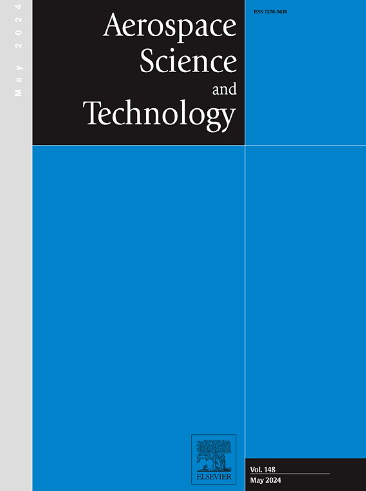Gust load alleviation of a flexible flying wing with linear parameter-varying modeling and model predictive control
IF 5
1区 工程技术
Q1 ENGINEERING, AEROSPACE
引用次数: 0
Abstract
This paper presents a practical model predictive control (MPC) framework for gust load alleviation of a flexible flying wing. Both the controller solving and state estimation are based on a reduced-order model, which features a linear parameter-varying (LPV) form, avoiding online linearization and reducing the scale of the corresponding quadratic programming problem. An improved modeling and model reduction process is used to enhance modeling efficiency and ensure that the reduced-order model can accurately capture the rigid-flexible coupled characteristics of the flexible flying wing under arbitrary gusts. By reconstructing the output of the control-oriented model to include both rigid-body motion and flexible vibrations, the rigid-flexible coupled multi-objective control is established as an MPC problem for reference tracking. The online optimization is formulated in a sparse fashion and combined with an iterative algorithm based on predicted trajectories, describing the variation of model dynamics within the prediction horizon more accurately. With a time-varying Kalman estimator for state updating, the closed-loop simulations are performed for gust alleviation performance validation. Additionally, the real-time potential of the proposed MPC framework is demonstrated through Monte Carlo simulations.
利用线性参数变化建模和模型预测控制减轻柔性飞翼的阵风负荷
本文提出了一种用于减轻柔性飞翼阵风负荷的实用模型预测控制(MPC)框架。控制器求解和状态估计都基于一个减阶模型,该模型采用线性参数变化(LPV)形式,避免了在线线性化,并缩小了相应二次方程编程问题的规模。改进的建模和模型缩减过程提高了建模效率,并确保缩减阶模型能准确捕捉柔性飞翼在任意阵风下的刚柔耦合特性。通过重构控制导向模型的输出,使其包括刚体运动和柔性振动,将刚柔耦合多目标控制建立为参考跟踪的 MPC 问题。在线优化以稀疏方式制定,并与基于预测轨迹的迭代算法相结合,从而更准确地描述预测范围内的模型动态变化。利用时变卡尔曼估计器进行状态更新,并进行闭环模拟以验证阵风缓解性能。此外,还通过蒙特卡罗模拟展示了所提出的 MPC 框架的实时潜力。
本文章由计算机程序翻译,如有差异,请以英文原文为准。
求助全文
约1分钟内获得全文
求助全文
来源期刊

Aerospace Science and Technology
工程技术-工程:宇航
CiteScore
10.30
自引率
28.60%
发文量
654
审稿时长
54 days
期刊介绍:
Aerospace Science and Technology publishes articles of outstanding scientific quality. Each article is reviewed by two referees. The journal welcomes papers from a wide range of countries. This journal publishes original papers, review articles and short communications related to all fields of aerospace research, fundamental and applied, potential applications of which are clearly related to:
• The design and the manufacture of aircraft, helicopters, missiles, launchers and satellites
• The control of their environment
• The study of various systems they are involved in, as supports or as targets.
Authors are invited to submit papers on new advances in the following topics to aerospace applications:
• Fluid dynamics
• Energetics and propulsion
• Materials and structures
• Flight mechanics
• Navigation, guidance and control
• Acoustics
• Optics
• Electromagnetism and radar
• Signal and image processing
• Information processing
• Data fusion
• Decision aid
• Human behaviour
• Robotics and intelligent systems
• Complex system engineering.
Etc.
 求助内容:
求助内容: 应助结果提醒方式:
应助结果提醒方式:


